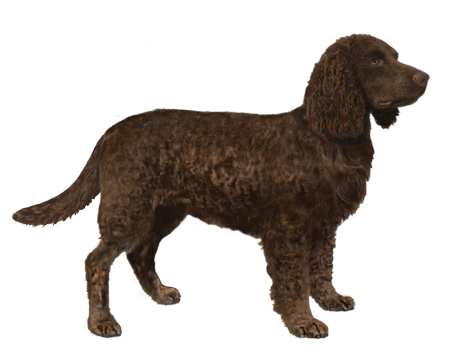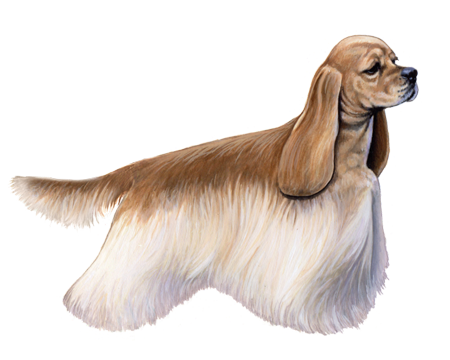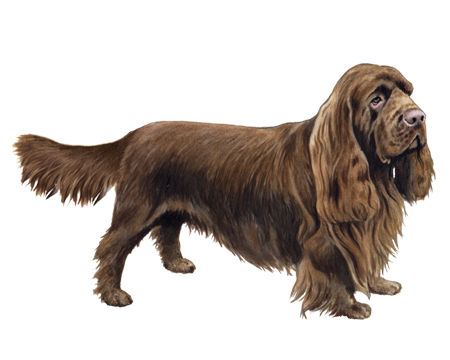
Field Spaniel
The Field Spaniel is an intelligent, sensitive, affectionate, and loyal breed. Though often more docile than other spaniels, Field Spaniels are playful, energetic dogs with a keen sense of smell and excellent hunting abilities.
Interested in discovering if your dog is a Field Spaniel?
Check out Wisdom Panel's DNA tests.

Field Spaniel Traits
General Appearance
The Field Spaniel's build is a combination of beauty and utility. These dogs have a noble carriage and proud attitude. Their well-balanced, medium-size bodies are built for activity and endurance.
Coat and Colouring
The Field Spaniel has a reasonably long coat that's either flat or slightly wavy. It's dense and water-repellent, with moderate feathering on the chest, underbody, backs of legs, and buttocks.
The coat can be various shades of black or liver. Tan points and white markings—which may include ticking and roaning—often appear on the Field Spaniel's coat.
Distinctive Physical Traits
The Field Spaniel's body is longer than it is tall, well-balanced, and solidly built. The breed's expressive eyes are almond-shaped, medium in size, and set moderately wide and deep. The color of the iris ranges from dark hazel to dark brown.
Pendulous, well-feathered ears hang close to the head. They are wide and long enough to reach the end of the muzzle. The tail is set low, just below the back, with a natural downward inclination.
Field Spaniel Temperament
The Field Spaniel's playful, affectionate, and loyal nature make it an excellent breed for families. Though often described as docile, Field Spaniels are energetic dogs that are always up for a good play session. They love spending time with people and need plenty of attention and human companionship to be happy.
Field Spaniels are usually friendly and trustworthy around children and tolerant of other dogs. This breed may seem reserved around strangers at first, but they typically warm up over time.
True to their spaniel nature, Field Spaniels have a keen sense of smell and excellent tracking, hunting, and retrieving abilities. They make fantastic pets for active families that enjoy being outdoors.


Field Spaniel History
Experts think the Field Spaniel may be a descendant of the Cocker Spaniel, Sussex Spaniel, and English Water Spaniel. Initially, all sporting spaniels fell into the Field Spaniel category. It wasn't until the late 1800s that the Field Spaniel earned recognition as a unique breed—separate from the Cocker Spaniel—due to its larger size.
The original Field Spaniel was a capable hunter. But continual cross-breeding with the Sussex Spaniel ultimately created a dog with greater length, heavier bones, and shorter legs. This body type didn't lend itself to hunting and nearly led to the breed's extinction. In response, breeders tried crossing the Field Spaniel with the English Springer Spaniel, which restored the appearance and hunting capabilities of the original Field Spaniel.
Researchers trace Field Spaniels' arrival in the United States to the late 1800s. The breed first received American Kennel Club recognition in 1894. Today, the Field Spaniel is one of the rarest breeds in the country.
Field Spaniel Care
Nutrition
Field Spaniels require a high-quality food that's appropriate for their life stage (e.g., puppy, adult, senior). To meet this active breed's nutritional needs, consider a diet formulated specifically for medium-size dogs.
Food-motivated dogs, Field Spaniels love mealtime and treats. To prevent them from becoming overweight, keep a close eye on their food portions. And be sure to take treats into account when tracking their daily calorie intake—especially if you're using them as rewards during training sessions. As a guideline, treats should make up no more than 10% of your dog's calories.
Grooming
Field Spaniels are above-average shedders. Weekly brushing will help keep shedding under control and help their coats stay clean and shiny. Occasional trimming around the head and feet may also be needed.
The Field Spaniel's long ears may make them more susceptible to ear infections. For this reason, check and clean your dog's ears regularly to prevent infections from developing. And all dogs need their nails clipped often to prevent splitting or cracking.
In addition to professional dental cleanings, establish a regular at-home dental care routine that includes teeth brushing and dental chews or treats. Maintaining good dental hygiene is essential for the overall long-term health of all dogs.
Exercise
Field Spaniels are active dogs that need daily exercise and mental stimulation. They love water and being outdoors, so swimming and hiking are great ways to burn off energy.
They also enjoy participating in dog sports that let them exercise both their bodies and their minds. Competitive obedience, tracking, agility, rally, and field events are all fun activities for your Field Spaniel.
Training
As intelligent, independent thinkers, Field Spaniels are highly trainable. They respond best to vocal commands delivered in a mild but consistent manner.
As mentioned, this breed is food-motivated, which can be helpful during training sessions. Offer treats as rewards for giving up inappropriate items they've retrieved (a typical behavior for members of the spaniel family).
Finally, early socialization will help your Field Spaniel develop into a well-adjusted adult dog.
Field Spaniel Genetic Health Conditions
-
Chondrodystrophy (CDDY) and Intervertebral Disc Disease (IVDD) Risk
Chondrodystrophy (CDDY) is a skeletal disorder characterized by shortened limbs and abnormal early degeneration of the spinal discs, or intervertebral disc disease (IVDD), which predisposes to disc herniation.
Knowing if your Field Spaniel is a carrier or at-risk for these conditions can help you and your veterinarian plan for your pup's lifelong care. With Wisdom Panel™ Premium, you can get results for over 200 genetic health tests.
Breed Group
Sporting
The sporting group breeds are incredibly diverse in personality and appearance, but can be characterized as very sturdy. They were developed to work closely with people and in general have a very responsive nature and high intelligence.
Resources
http://images.akc.org/pdf/breeds/standards/FieldSpaniel.pdf
https://www.akc.org/dog-breeds/field-spaniel/
https://www.akc.org/expert-advice/lifestyle/5-reasons-to-love-the-field-spaniel/
Reviewed 26 July 2020 by Cindy Elston, DVM, MPH


























































